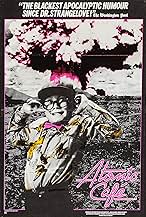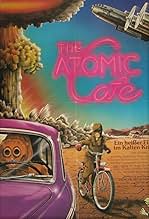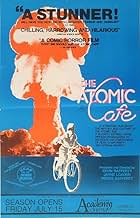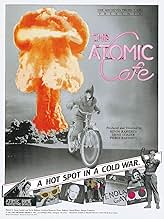NOTE IMDb
7,6/10
4,7 k
MA NOTE
Ajouter une intrigue dans votre langueDisturbing collection of 1940s and 1950s United States government-issued propaganda films designed to reassure Americans that the atomic bomb was not a threat to their safety.Disturbing collection of 1940s and 1950s United States government-issued propaganda films designed to reassure Americans that the atomic bomb was not a threat to their safety.Disturbing collection of 1940s and 1950s United States government-issued propaganda films designed to reassure Americans that the atomic bomb was not a threat to their safety.
- Réalisation
- Casting principal
- Nomination aux 1 BAFTA Award
- 2 victoires et 1 nomination au total
Paul Tibbets
- Self
- (images d'archives)
Harry S. Truman
- Self
- (images d'archives)
- (as President Harry S Truman)
W.H.P. Blandy
- Self - Commander of the Bikini Test
- (images d'archives)
- (as Vice Admiral W.H.P. Blandy)
Brien McMahon
- Self
- (images d'archives)
- (as Sen. Brian McMahon)
Lloyd Bentsen
- Self
- (images d'archives)
- (as Rep. Lloyd Bentsen)
Owen Brewster
- Self
- (images d'archives)
- (as Sen. Owen Brewster)
Julius Rosenberg
- Self
- (images d'archives)
Ethel Rosenberg
- Self
- (images d'archives)
Val Peterson
- Self - Director of Civil Defense
- (images d'archives)
- (as Gov. Val Peterson)
Lyndon B. Johnson
- Self
- (images d'archives)
- (as Sen. Lyndon B. Johnson)
Lewis Strauss
- Self - Chairman, Atomic Energy Commission
- (images d'archives)
- (as Lewis L. Strauss)
George Molan
- Self
- (images d'archives)
- (as Cpl. George Molan)
George Portell
- Self
- (images d'archives)
- (as Tech Sgt. George Portell)
Jerry Schneider
- Self
- (images d'archives)
Sergeant Weaver
- Self
- (images d'archives)
Seymour Melman
- Self - Columbia University
- (images d'archives)
- (as Prof. Seymour Melman)
Mario Salvadori
- Self - Columbia University
- (images d'archives)
- (as Prof. Mario Salvadori)
Nikita Khrushchev
- Self
- (images d'archives)
Avis à la une
I saw The Atomic Cafe in a theater when it was first released. Someone exclaimed derogatorily as they walked out on it. But I thought it was brilliant. Sort of a sub-genre of documentary, this one had no commentary, narrative or explanations for the material presented. No retroactive interviews with those who were there. It relied 100% on archival materials.
A few years back, I visited the Trinity Site (here in New Mexico) on the 50th anniversary of the first test of the bomb. Quite a few of those who were somehow involved back then and still living turned up for the event. So I did get to hear some hindsight comments. Definitely different than what was being said back then, and such commentary could have really changed the picture.
This is a rare approach, and therefore thought provoking. One can argue that the choice of material, editing and music track impose some interpretation, and there may be something to that. Although it's unlikely that one could turn the story into something really different unless latter-day, hindsight interviews were added to provide a different spin.
Being a "Baby Boomer", I was born during the times depicted in the movie, and have some early memories of them. For those who were alive in that time, it's fascinating to see how it tweaks your memory. I, for one, didn't think deep thoughts about the "duck and cover" drills at school - it was just another thing that got us out of our seats, like fire drills and recess. But it does tweak memory, to bring back things not thought of for many years. Interesting to consider how one's own memory is incomplete, wanders, can be influenced, etc. (Now, re-read Orwell's 1984.)
Brilliant, and disturbing. Interesting to consider in light of current events (spring 2003).
A few years back, I visited the Trinity Site (here in New Mexico) on the 50th anniversary of the first test of the bomb. Quite a few of those who were somehow involved back then and still living turned up for the event. So I did get to hear some hindsight comments. Definitely different than what was being said back then, and such commentary could have really changed the picture.
This is a rare approach, and therefore thought provoking. One can argue that the choice of material, editing and music track impose some interpretation, and there may be something to that. Although it's unlikely that one could turn the story into something really different unless latter-day, hindsight interviews were added to provide a different spin.
Being a "Baby Boomer", I was born during the times depicted in the movie, and have some early memories of them. For those who were alive in that time, it's fascinating to see how it tweaks your memory. I, for one, didn't think deep thoughts about the "duck and cover" drills at school - it was just another thing that got us out of our seats, like fire drills and recess. But it does tweak memory, to bring back things not thought of for many years. Interesting to consider how one's own memory is incomplete, wanders, can be influenced, etc. (Now, re-read Orwell's 1984.)
Brilliant, and disturbing. Interesting to consider in light of current events (spring 2003).
With no narration other than that provided by historical clips, this movie justly states how ludicrous the idea of nuclear war was, and is. The producers of this film spent years going through declassified governmental film archives to find some of the most chilling, and hilarious, footage ever taken. It also tells how the US government screwed over the Bikini Islanders, and has some fine coverage of the spoon-feeding of propaganda to the US public through the 40's and 50's.
A great movie for just a laugh, or for some interesting historical perspective on a unique time in the recent US past. I loved the clip of the guy who invented a lead-lined suit, put it on his son, and then had him try to ride a bike. Could we have possibly been this gullible just a few decades ago? Can you say "duct tape and plastic sheeting"?
Duck and cover everyone!
A great movie for just a laugh, or for some interesting historical perspective on a unique time in the recent US past. I loved the clip of the guy who invented a lead-lined suit, put it on his son, and then had him try to ride a bike. Could we have possibly been this gullible just a few decades ago? Can you say "duct tape and plastic sheeting"?
Duck and cover everyone!
An ostensibly tongue in cheek documentary about the nuclear age of the late 40's and 50's, juxtaposing the horrific realities of the arms race with cheery misinformation(and simplistic redbaiting) doled out to the public by the US government and private sector. The overall effect is chilling-for every scene of hilariously misguided propaganda and dismissal of nuclear danger(an army film cheerfully assures a fictional fallout victim that his hair will grow back in no time) there's scenes of Pacific islanders affected by fallout from remote nuclear tests and US soldiers getting debriefed on the minimal dangers of witnessing a nuclear detonation a few miles away(with goggles on, to be fair). Not an objective documentary by any means - not that it should be - the filmmakers excoriate the duplicity of the government and the mock the complacency of the public with equal zeal, but there's a certain absurdist charm to the whole affair.
The fact that this is true makes this short film scary and worrying...but doesn't stop it from being very entertaining and funny. The pieces of real life propaganda are amazing and it's often hard to believe that it's all true.
However remember that all of the snipets of film are cut and pasted together with music added over the top, so everything you see isn't exactly as it seems... it's propaganda on propaganda...and highly entertaining. A must see for any one interested in American History, Propaganda, or just wanting a good sorry laugh.
However remember that all of the snipets of film are cut and pasted together with music added over the top, so everything you see isn't exactly as it seems... it's propaganda on propaganda...and highly entertaining. A must see for any one interested in American History, Propaganda, or just wanting a good sorry laugh.
THE ATOMIC CAFE is one of those few rare documentaries that doesn't have a narrator or a framing figure . All it consists of are clips in a chronological order of the history of the atomic bomb and of the early stages of the geo-political situation of what became known as " The Cold War " which was the direct result of the bomb . There's two ways of looking at this . One is the subject matter is a little bit dry and absurd and the second point of view of view is that the audience are allowed to make up there own mind and it's somewhat refreshing to see a documentary that doesn't involve someone bludgeoning the audience over the head while sticking their opinions down their throat in a painfully smug and snide manner . You can tell this wasn't made by Michael Moore
One wonders what life was like in a pre-nuclear age ? I remember the cold war in the 1980s and the paranoia of that era was chilling , so much so that for people of my generation still refer to the 1984 BBC docu-drama THREADS as the most terrifying thing they have ever seen . That said it could also be argued that if it wasn't for the bomb then a conventional war that would have surpassed the death toll of the second world war might have broken out between 1945 and the collapse of the Soviet Union in 1991 . Reagen in The White House and Brezhnev in the Kremlin ? Not really a recipe for peace and the fact that nuclear weapons are so terrible to contemplate probably focused the minds of world leaders
Being an American documentary all the clips are from an American point of view with an exception of a clip that's almost certainly from an early edition of PANORAMA from the BBC . This is a pity because I would liked to have seen what sort of propaganda if any the USSR was producing at the same time . That said the old cliché of " Americans don't understand irony " is evident as someone praises the virtues of American freedom " because we have shopping malls that are full of food and clothes and most families can afford cars " . I think someone is confusing system of government with economics .As I write this in 2014 China has shopping malls full of food and clothes and the Chinese people can afford to drive cars . The difference is there's no democratic system of government in China so democracy and capitalism are not the one and the same thing , but I guess that clip is to illustrate the inherent absurdity of propaganda ? Likewise we get clips of real life footage of American servicemen being used to test the effects of being caught in an atomic blast " There's nothing to worry about " and of relaxing should your city be caught up in a nuclear war . Did someone say " Absurd ? "
One very interesting point that is often talked about by the CND mob is in relation to the bombing of Hiroshima and Nagasaki as in " Why didn't the Americans drop the bombs in a remote unpopulated area of Japan to force their surrender ? " I've often thought that myself and am unable to give a counter argument to that question . Here we see an interview with Paul Tibbets the pilot who dropped the bomb on Hiroshima who goes in to some detail - it's because these cities were untouched by arial bombing and the American government wanted to study the effects on a bombed city after the war had ended . Some people might think this is amoral or cruelly cynical but you can make up your own mind as to morality during wartime and THE ATOMIC CAFE does allow the audience to think for themselves no matter what the opinions of this documentary's producers are . In that respect it's very refreshing
One wonders what life was like in a pre-nuclear age ? I remember the cold war in the 1980s and the paranoia of that era was chilling , so much so that for people of my generation still refer to the 1984 BBC docu-drama THREADS as the most terrifying thing they have ever seen . That said it could also be argued that if it wasn't for the bomb then a conventional war that would have surpassed the death toll of the second world war might have broken out between 1945 and the collapse of the Soviet Union in 1991 . Reagen in The White House and Brezhnev in the Kremlin ? Not really a recipe for peace and the fact that nuclear weapons are so terrible to contemplate probably focused the minds of world leaders
Being an American documentary all the clips are from an American point of view with an exception of a clip that's almost certainly from an early edition of PANORAMA from the BBC . This is a pity because I would liked to have seen what sort of propaganda if any the USSR was producing at the same time . That said the old cliché of " Americans don't understand irony " is evident as someone praises the virtues of American freedom " because we have shopping malls that are full of food and clothes and most families can afford cars " . I think someone is confusing system of government with economics .As I write this in 2014 China has shopping malls full of food and clothes and the Chinese people can afford to drive cars . The difference is there's no democratic system of government in China so democracy and capitalism are not the one and the same thing , but I guess that clip is to illustrate the inherent absurdity of propaganda ? Likewise we get clips of real life footage of American servicemen being used to test the effects of being caught in an atomic blast " There's nothing to worry about " and of relaxing should your city be caught up in a nuclear war . Did someone say " Absurd ? "
One very interesting point that is often talked about by the CND mob is in relation to the bombing of Hiroshima and Nagasaki as in " Why didn't the Americans drop the bombs in a remote unpopulated area of Japan to force their surrender ? " I've often thought that myself and am unable to give a counter argument to that question . Here we see an interview with Paul Tibbets the pilot who dropped the bomb on Hiroshima who goes in to some detail - it's because these cities were untouched by arial bombing and the American government wanted to study the effects on a bombed city after the war had ended . Some people might think this is amoral or cruelly cynical but you can make up your own mind as to morality during wartime and THE ATOMIC CAFE does allow the audience to think for themselves no matter what the opinions of this documentary's producers are . In that respect it's very refreshing
Le saviez-vous
- AnecdotesThe segment "Duck and Cover" showed how school children were reassured by "Bert the Turtle" that they would survive a nuclear bomb by simply forming a huddle together by the wall of the school-house. "The Atomic Cafe" has been attributed to raising public consciousness of the short film "Duck and Cover" and introducing it to a whole a new generation.
- Citations
Army information film: When not close enough to be killed, the atomic bomb is one of the most beautiful sights in the world.
- Bandes originalesWhen the Atom Bomb Fell
Written by Karl Victor Davis and Connecticut 'Harty' Taylor
Performed by Karl and Harty
Courtesy of CBS Records, Inc.
Meilleurs choix
Connectez-vous pour évaluer et suivre la liste de favoris afin de recevoir des recommandations personnalisées
- How long is The Atomic Cafe?Alimenté par Alexa
Détails
Box-office
- Budget
- 300 000 $US (estimé)
- Montant brut aux États-Unis et au Canada
- 22 293 $US
- Week-end de sortie aux États-Unis et au Canada
- 4 098 $US
- 5 août 2018
- Montant brut mondial
- 22 293 $US
- Durée1 heure 26 minutes
- Couleur
- Mixage
- Rapport de forme
- 1.33 : 1
Contribuer à cette page
Suggérer une modification ou ajouter du contenu manquant





























